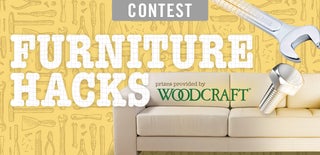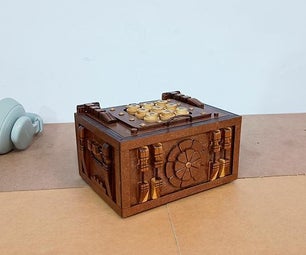Introduction: 9 Alternative Storage Ideas
My apartment in San Francisco checked off many desirable features: hardwood floors, nice neighborhood, new appliances, great access to public transit, and even laundry in the building. The one thing it seriously lacked was closet space. A 5-month temporary sublet turned into a 5-year stay which gave me plenty of time to come up with creative storage solutions to utilize the apartment to its fullest.
I'll cover my favorite IKEA hack, vintage accessory, bike storage, shelving upcycle, furniture repurposing, organizational bin win, and a few others. I was able to do basic woodworking to make these ideas possible at Techshop in San Francisco, although not all the projects here require tools.
Step 1: Eight Cent Shelving
I needed a little extra storage in my kitchen and preferred it be open shelving. Since I didn't own the space, I wanted to make minimal impact on the building itself and avoid nailing anything in place. This solution came together pretty quickly once I understood the needs.
Using leftover, scrap plywood from other projects, I built and installed this friction-fit shelving system. The bottom two layers are twice as tall as the upper (11" vs. 5.5") which worked out serendipitously for the sizes of things I wished to store. The eight cents estimated cost was the brads I used to secure the lip to the bottom board of each shelf.
The whole system was created based on initial measurements and then cut first to be oversized. I took the pieces home, measured a second time with all the pieces in hand, and marked cut lines for exact fit. The right vertical support is fitted in between the window frame and rear wall and the left is freestanding against the cabinets. The five shelves hold the vertical supports in place and the window frame keeps the system nice and stable. It seems precarious to think about not bolting this into the wall, but trust me - it's quite stable.
Method Notes
- This system is essentially an H with five cross bars. The vertical supports have identical dado cuts to allow the shelves to slide in and out, which is important because the shelves hold the vertical supports in place. To make it easier on yourself, take your measurements of where you want the dado cuts and then cut both the left and right vertical support for each level before moving the fence. This will ensure a nice, level slot for the shelves.
- No fasteners are used to anchor this system to the wall or anywhere else.
- All shelves are identical, with the exception of the outer lips of the bottom two. These are slightly larger to ensure that the contents of the shelf stay safely tucked in.
- Each shelf is simple construction of a bottom and front lip, nailed at the bottom by a simple brad on each corner. Using this method, each shelf will have a basic L shape when removed. Given the short lip of all shelves, I didn't feel a top brad was needed and never had a problem with wiggle.
To disassemble, you would just need to slide out the shelves individually and then lift away the vertical supports. When I moved out of this apartment, the next tenant liked these so much that I left them behind. They wouldn't do me much good elsewhere because they're custom fitted to this kitchen and besides, it gives me an excuse to build something new for the next home ;-)
Step 2: IKEA Expedit Filing Hack
I converted a regular 1-drawer IKEA expedit insert into a filing cabinet and put it in my regular 5x5 expedit system. I really can't believe IKEA doesn't already do this! It's a huge space saver and great to not need another standalone piece.
Note: This one has had a lot of interest from people who've seen it in person, so I wrote up a separate instructable just for this project.
Step 3: Trunks, Trunks, Trunks!
We frequently have guests stay but living in a city makes a separate guest room impractical. My solution was this nice, vintage trunk placed in the room we often convert to our 'guest room'. It contains all the pillows, blankets, sheets, and air mattresses (we have a twin and queen tucked in there) we need for 1-3 guests. If we needed to store these things elsewhere they'd take up a good portion of a closet but it's a pretty attractive piece of furniture on its own and doubles as a quick seat when it's closed.
I also keep a smaller trunk in my IKEA expedit system which holds all my stationary.
Protip for those near the Bay Area:Where do I find these gorgeous, vintage trunks and alternative storage pieces? The Oakland White Elephant Sale, usually. Check it out every Jan/Feb/March. It benefits the community, it's entirely volunteer driven, and I usually do a nice rotation where I donate things I'm no longer using and find new things that meet my current needs while extending the life of someone else's formerly loved belongings. I can't say enough about the White Elephant Sale! It makes me all warm and fuzzy.
Step 4: Shoe Rack
We used to use this basic, metal expandable rack but over the years I upgraded to this bookcase that worked beautifully as both a shoe rack and a nice bench for people to sit while they put their shoes on. If you don't have space for shoes in a closet, this turned out to be a great way to store them.
Step 5: Bike Storage
I installed some bike hooks in our building for us and our neighbors to keep our commuter bikes but I didn't feel comfortable leaving my nice, new road bike down in the common area as we'd had some problems with theft. In our space constrained abode, I decided to add a regular bike hook (see detail shot) to my IKEA expedit unit (are you noticing a trend) using a few heavy duty command grips on the back. Note: these are the type that are sticky on both sides, not the version that acts like velcro. My bike was safely tucked out of the way and was easy to take out for a ride and put back.
Updated as a response to some of the comments: I made sure the weight of the bike was still mostly on the bottom wheel and not the hook itself, as you can see in the photo. You can do this by setting the bike next to the unit you're planning to add the hook to and marking with tape or a pencil line where the top wheel naturally touches the vertical surface where the hook will be mounted while the bottom wheel is resting on the ground. From there, line up the bike hook so the natural resting place is the same for where the hook is placed and you should be set!
Step 6: Organizing Workout Clothes
This one is tucked into a closet but shows how to make better use when you are space constrained. My husband and I shared one closet that was the size of a single, standard door. To maximize this space, I installed a simple horizontal shelf using scrap plywood from other projects (and believe me, this was functional and sturdy but not aesthetically pleasing since I knew no one, not even us, would see this) to make vertical supports and a horizontal shelf. I then found simple rubbermaid bins to keep my athletic clothes organized and out-of-the-way below our hanging clothes and above the laundry basket.
Awful photo, but awfully useful idea. (Sorry for that :-P)
Step 7: Espresso Island
Without enough counter space in our kitchen, I looked to other solutions for important appliances that we wanted to use often. I ended up making 'Espresso Island' using a prefab sideboard. This had room for the espresso machine, our stacked, colorful cups, and little wire racks that had room for the beans and other accessories. The bottom shelves also had a mini wine rack and room for other kitchen appliances. Pretty handy addition to our kitchen. We also really liked that it allowed for more vertical storage without feeling massive in the kitchen.
Step 8: Additional Kitchen Storage
This IKEA bookcase has taken on many purposes and fit nicely next to the refrigerator in our kitchen. A simple milk crate fit inside to collect recycling and we used the other shelves for cookbooks, our reusable grocery bags, and other helpful kitchen supplies. Nice to have a place to store these things to keep them from being left out in the open.
Step 9: CNC* Milled Chair With Storage
I made a set of a dozen chairs in three different shapes. The inside is open with room for simple storage. We often kept our baseball gloves in here since they were an awkward shape for many other places.
*CNC stands for computer numerical control for those who are just learning :-)
What other great things have you done to make use of a great space with less-than-awesome storage?

Runner Up in the
Living Without Closets Contest

Runner Up in the
Leftovers Challenge

Runner Up in the
Furniture Hacks Contest




![Raised Bed Garden [for Those With Only Hand Tools!]](https://content.instructables.com/F2Q/UUXE/JUQSKGLC/F2QUUXEJUQSKGLC.jpg?auto=webp&crop=1%3A1&frame=1&width=130)






